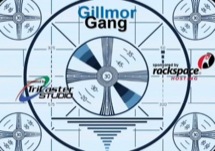The Gillmor Gang — Robert Scoble, Kevin Marks, Keith Teare, and Steve Gillmor — well, we talked Google Glass. @scobleizer has certainly made the case for the life-altering shower-taking scenarios, but what the Gang got into was what happens next. Do we wait for the actual launch early next year, or is the die already cast with this alpha rollout? One thing for sure: there’s plenty to unravel in this second Glass hour in a row.
What lurks beneath the actual hardware and the choices Google has made in terms of enhanced reality – no, and an atomization of some key aspects of the phone – yes, is the stark choice the search company must make in playing open with Android. @scobleizer reports switching about 30% of his notifications and alerts from iOS to Android, understandable as the Glass interface is the first point of contact for audio chimes and call announcements but not the visual. Glass is in reality more of an audio device with some visual renderings and recorders.
But will the price point Scoble suggests they need to meet — $200 — really be reachable to them unless they can get mass data to subsidize some significant portion of the hardware? More likely, they will open the hardware to iOS much like they just did with Google Now (part of the Search app) and make their stand with turn by turn against Siri. Both Google and Apple will face an increasingly sophisticated customer base that can see just how far voice and facial recognition can really go without mass data from across what used to be called the Web.
In a way, Glass is Google’s response to the iPad Mini, which has rolled up an enormous part of the existing tablet market by cannibalizing its big tablet and adding a large percentage of the 7-inch minis. At several Gartner conferences this week, the number of Minis was reminiscent of what happened when the iPad first broke through on planes. In one fell swoop, Apple captured the lion’s share of the unique gestures made possible by the Mini form factor, which makes it easy to do 90% of both enterprise and social computing in conjunction with the phone. Glass does the same thing for Android, creating a pool of unique gestures that can be expanded upon with advanced services that connect Glasses together.
The common wisdom is that Google doesn’t get social, but Glass is an opportunity for them to get out front with the phone, just as Apple has with the Mini. If Google doesn’t interoperate with the Mini, it will provide an opening for Apple and the nextgen iPhone. More importantly, Glass has to reach the broad market as Search, Gmail, Apps, and Maps have done to feed the data monster it sells off as realtime advertising. Apple’s common wisdom Achilles Heel, not getting the Web and massive Cloud scale, means they will continue to open their platform to Google to maintain market while exploiting their lead in media integration. They lose data they can’t yet handle, but maintain their hold on developer and media revenue and buy much needed time.
@stevegillmor, @scobleizer, @kteare, @kevinmarks
Produced and directed by Tina Chase Gillmor @tinagillmor
